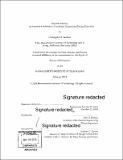Beyond industry : an expanded definition of authentic engineering design education
Author(s)
Saulnier, Christopher R.
Download1124678976-MIT.pdf (13.52Mb)
Alternative title
Expanded definition of authentic engineering design education
Other Contributors
Massachusetts Institute of Technology. Institute for Data, Systems, and Society.
Advisor
John G. Brisson.
Terms of use
Metadata
Show full item recordAbstract
Authentic approaches to design education are typically defined as experiences centered on industry involvement. This industry connection is commonly either in the form of projects provided by industry partners or practicing engineers that serve as mentors to students. After exploring the goals and current practices of design education, this dissertation proposes an expanded definition of authentic design education: any design project with impact beyond the classroom environment that encourages the development of a student's self-identity as an engineer. To investigate the potential benefits afforded by an expanded definition of authentic design, a new design class was developed, taught, and evaluated across four years. The class, entitled Design for the Wilderness, was developed with a focus on projects that have impact beyond the classroom environment. Students were required to design and build products that they relied on while traveling in remote wilderness environments. These impactful projects required students to experience the results of their design decisions. Building on our experiences implementing Design for the Wilderness, a curricular approach of Design for Use is introduced that requires students to use products developed by their peers. Design for Use helps increase students' understanding of human-centered design principles by encouraging students to confront the interplay between their intentions when designing a product and their experiences when failing to understand the intentions behind products designed by their peers. This dissertation also considers a mechanical engineering capstone design class (MIT's 2.009). An interesting outcome of this class is that some teams continue to work on commercializing their products after the semester ends. Team characteristics most strongly correlated with persisting on product development beyond the end of the class are related to healthy team dynamics and a positive social environment. Teams that persisted spent more of their time working together, had fewer teammates that worked significantly more or less than the team average, and spent more of their time simply "hanging out" in lab. Drawing on our findings from investigating multiple approaches to authentic design education, recommendations are made for the future development of effective engineering design classes.
Description
Thesis: Ph. D., Massachusetts Institute of Technology, School of Engineering, Institute for Data, Systems, and Society, 2019 Cataloged from PDF version of thesis. Includes bibliographical references (pages 181-187).
Date issued
2019Department
Massachusetts Institute of Technology. Institute for Data, Systems, and Society; Massachusetts Institute of Technology. Engineering Systems DivisionPublisher
Massachusetts Institute of Technology
Keywords
Institute for Data, Systems, and Society.